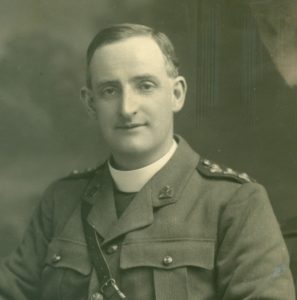The reformation of one’s life must be the work of every day. I should take each rule and duty, think how Jesus acted, or would have done, and contrast my conduct with His.
COMMENT: Fr Doyle’s words today are direct and relevant for us all.
The daily reformation Fr Willie recommends must be practical in nature. We do not reform our lives in the abstract by imagining great things we would do for God in some hypothetical reality. We must reform our own lives in the practical circumstances in which we live. Fr Willie gives us the recipe for doing this, by considering the “rule and duty” of each day.
Fr Willie himself had to live this daily reformation in the dreadful, gritty reality in which he lived. Here is an excerpt from O’Rahilly’s biography, quoting extensively from Fr Willie’s letters home, detailing how he fulfilled one of his duties – and also one of the corporal works of mercy – by burying the dead. Let us remember that holiness is in the duty of today, whatever its circumstances. It is not to be found in pleasant daydreams about some mythical day when everything goes along smoothly as we would like.
NOTE: Those who may be squeamish about death and gore may want to skip this particular quote.
It was not to be, however, for still another adventure awaited him. On returning, he found that a dead man had been brought in for burial. The cemetery, part of a field, was outside the town in the open country, so exposed to shell and rifle fire that it could not be approached by day. As soon as it was dark we carried the poor fellow out on a stretcher, just as he had fallen, and as quietly as we could began to dig the grave. It was weird. We were standing in front of the German trenches on two sides, though a fair distance away, and every now and then a star-shell went up which we felt certain would reveal our presence to the enemy. I put my ritual in the bottom of my hat and with the aid of an electric torch read the burial service, while the men screened the light with their caps, for a single flash would have turned the machine guns on us. I cannot say if we were seen or not, but all the time bullets came whizzing by, though more than likely stray ones and not aimed at us. Once I had to get the men to lie down as things were rather warm; but somehow I felt quite safe, as if the dead soldier’s guardian angel was sheltering us from all danger, till the poor dust was laid to rest. It was my first war burial though assuredly not my last. May God rest his soul and comfort those left to mourn him.”
The burials soon became more frequent, and Fr. Doyle had many gruesome experiences. Thus a few days later two bodies fell to bits when lifted off the stretcher and he had to shovel the remains of one poor fellow into the grave, a task which taxed his endurance. On 1st April he had a further vivid experience of the horrors of war:
“Taking a short cut across country to our lines I found myself on the first battle field of Loos, the place where the French had made their attack. For some reason or other this part of the ground has not been cleared, and it remains more or less as it was the morning after the fight. I had to pick my steps, for numbers of unexploded shells, bombs and grenades lay all round. The ground was littered with broken rifles, torn uniforms, packs, etc., just as the men had flung them aside, charging the German trenches. Almost the first thing I saw was a human head torn from the trunk, though there was no sign of the body. The soldiers had been buried on the spot they fell; that is, if you can call burial, hastily throwing a few shovelfuls of clay on the corpses: there was little time, I fancy, for digging graves, and in war time there is not much thought or sentiment for the slain. As I walked along, I wondered had they made certain each man was really dead. One poor fellow had been buried, surely, before the breath had left his body, for there was every sign of a last struggle and one arm was thrust out from its shroud of clay. A large mound caught my eye. Four pairs of feet were sticking out, one a German, judging by his boots, and three Frenchmen friend and foe are sleeping their long last sleep in peace together. They were decently covered compared with the next I saw; a handful of earth covered the wasted body, but the legs and arms and head were exposed to view. He seemed quite a young lad, with fair, almost golden, hair. An unknown soldier was all the rough wooden cross over him told me about him; but I thought of the sorrowing mother, far away, thinking of her boy who was missing, and hoping against hope that he might one day come back. Thank God, Heaven one day will reunite them both. I found a shovel near at hand, and after a couple of hours stiff work was able to cover the bodies decently, so that on earth at least they might rest in peace.”

